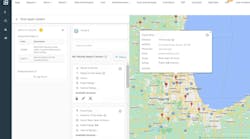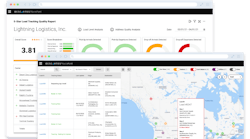“There was nothing consistent about the process,” Roger A. Placzek, vice president of sales & pricing for deBoer, explains. “For every customer, we were calculating fuel surcharges manually to make sure the charges covered only the cost of fuel. Separately, we had to cover our other costs and make a profit based on our freight rates.
“Without a tool for managing this process accurately and consistently, the freight rate had to absorb more of the cost because the fuel surcharge didn’t cover the cost of fuel for a shipment,” he continues.
Placzek says deBoer decided it needed an IT solution that would enable it to maintain profitability by accurately determining fuel surcharges.
Solution: The carrier determined it could better manage its profitability and address customers’ concerns about fuel surcharge issues by implementing the Truckload Cost Information System (TL/CIS) and its fuel surcharge and fuel cost analysis reporting capabilities. TL/CIS is provided by Rockville, MD-based Transportation Costing Group (TCG).
TCG describes TL/CIS as an activity-based costing system designed for motor carriers operating in an irregular-route environment.
“TCG has given us the ability to develop a consistent and accurate analysis of fuel costs and fuel surcharges,” advises Placzek. “The accuracy of the profitability analysis tool lets us determine if we are generating a reasonable profit. Without this unique capability, we could be undercompensated. In that respect, the fuel surcharge and fuel cost analysis reporting capability of the TL/CIS solution definitely pays for itself.”
Working with TL/CIS, Placzek points out, deBoer management can review accurate reports on costs, profitability and business performance. He says the carrier’s sales and marketing teams also use the data to identify nonprofitable shipments and lanes—and to work to improve them.
The TL/CIS program is also reconcilable with the carrier’s general ledger, giving management a high degree of confidence in the data, TCG says. According to TCG, the fuel surcharge and fuel cost analysis reporting capabilities have given deBoer a “means of determining fuel costs for each customer, every load, and any lane based on a number of factors. Included in the calculation are total, loaded and empty miles, and out-of-route mileage and special services such as refrigerated hauls and PTO-driven blower or vacuum pumps.” In addition, the software enables deBoer to create “unique fuel cost profiles for customers” and evaluate fuel surcharges in particular lanes.
“Using TL/CIS has transformed deBoer into a company that manages profits and not just miles, revenue and other traditional industry measurements,” says Placzek. “It has proven to be invaluable in helping lower our operating ratio, which means we have a faster ROI and more profitability. We now find that we have no ‘bad’ business, only badly priced business.”


